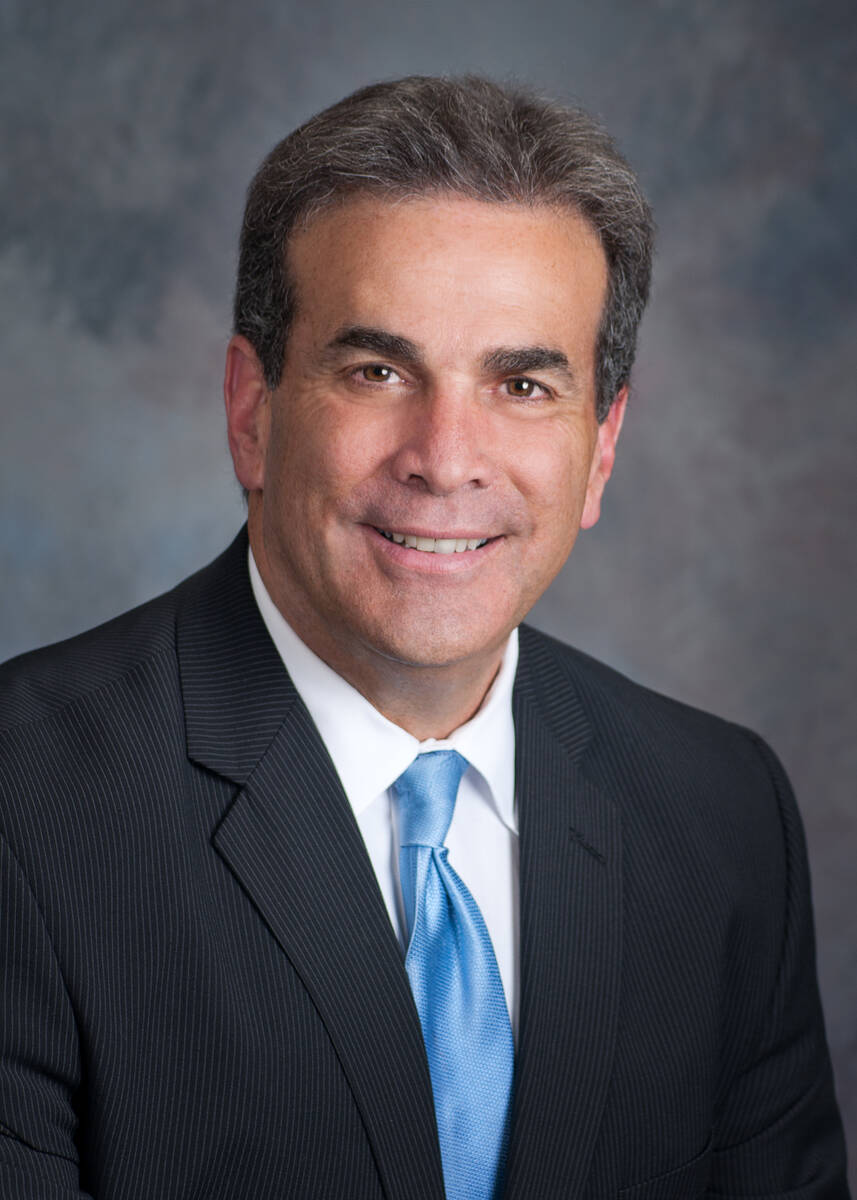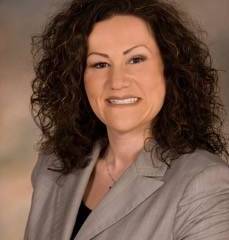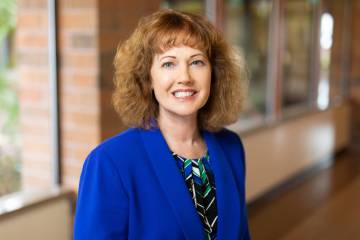John Guedry has left his mark on Las Vegas in the banking and financial services industries, but as he goes off into retirement, don’t expect him to drop out of the spotlight. He still intends to stay involved in many community organizations.
The CEO of Bank of Nevada said his goodbyes to the office last week as he stepped down from the bank where he has served since 2011, including as president and chief operating officer. Guedry has been replaced by Robert Cerminaro, a 25-year veteran of the banking industry relocating to Las Vegas from New York, effective Jan. 1.
Guedry, 62, served as president of Business Bank of Nevada until City National Bank purchased it in 2007 and remained as executive vice president until 2010. He is past chairman of the Nevada Bankers Association.
Guedry has made an impact on many organizations and will continue to do so for many of them in retirement. He serves as a member of the board of directors of the Metro Chamber of Commerce, but is stepping down from that.
He’s part of the Leadership Institute of Nevada and was the 2022 game chair for the Las Vegas Bowl, a college football bowl game. He’s also a board and executive committee member of The Darren Waller Foundation.
Guedry is a former board member for the Clark County Public Education Foundation and advocate for splitting up the Clark County School District, which he will continue to be part of that movement.
The New Orleans native moved to Las Vegas in 1974 and he and his wife, Debra, have two daughters, Jennifer and Jaclyn, and twin 11-year-old grandsons, Bradley and Brayden.
Q: What prompted your retirement?
A: Maybe the biggest thing is family. The grandsons are becoming active in a lot of different things with school and sports. (My wife’s parents) are here. I feel like in the pandemic I got way out of shape and stopped doing things that were part of my routine. My goal is to get back into biking on a more consistent basis so I can do a really big ride next year. I plan in May to make it from the Mexico border to the Canadian border in California, Oregon and Washington.
Q: What about your other activities?
A: I am still doing a lot of volunteer work in the education space. I am working with the group that sponsored and submitted the ballot initiative that would allow the municipalities to break away from the Clark County School District. (It failed to meet the threshold to appear on the 2024 ballot for now).
Q: Why are you pursuing this?
A: After 15 years of working with the school district I have come to the conclusion it’s become too big and bureaucratic and hard to get anything meaningful done. I feel by breaking the district up and having smaller districts they will become more manageable and more transparent. Ultimately districts like in North Las Vegas that have a disproportionate number of students in poverty and have English language learning barriers will be assured to get (more funds). Right now, the Clark County School District gets it and there’s no way of knowing if those funds are following those students. It doesn’t appear to me that they are.
Q: What can you do in the future to prevent the Las Vegas Bowl, which was played at Allegiant Stadium Dec. 17, from getting moved from a nighttime start to late morning at the last minute because of an NFL schedule change?
A: Unfortunately, the NFL flex schedule is a problem. We’re aware of it, and the Raiders are aware of it. We’re asking the Raiders right now to lock us into a date next year and give the NFL a heads up so, hopefully, they don’t schedule something.
Q: You have been here almost 50 years. What stands out to you over that time?
A: I remember when I was at UNLV in the late ‘70s looking at the old MGM, which is now Bally’s, and thinking what a massive hotel that was. When I look at the hotels surrounding it today, it looks miniature. How big these properties have become on the Strip is mind boggling to me. And now we have all of these entertainment and sports opportunities that didn’t exist back then. Thinking that the NFL would be here wasn’t on anybody’s mind let alone a Super Bowl. It’s how we have grown up as a city along with having a Smith Center. It’s a real city but still has a bit of that feel of a small town. There are still a lot of people who know a lot of people. It’s a lot of the same people very actively engaged in different things.
Q: What are the opportunities for the Las Vegas economy in the future?
A: We’re still very much a single-driver industry — very dependent on gaming and tourism. I think the work that was done during the recession on the economic diversification plan was a great plan in its simplicity. (We’re seeing that with health care and the UNLV medical school). Where do we have assets that would give us an advantage with competing states? Renewable energy is a perfect one. We have sun and wind in the south, thermal and lithium deposits in the north. We have all of these assets that can be leveraged into a growth industry and be more competitive than our neighboring states. Where we are falling short is education. We are not preparing a workforce for these STEM-oriented jobs. We have to fix that or we will fall short because we won’t be able to recruit those companies that want to come here because we don’t have the workforce here.
Q: Where is Las Vegas today with the economy and where do you see it heading?
A: I think we’re in an OK place. We’re experiencing the same things a lot of the rest of the country is experiencing. Inflation has affected disposable income so that’s going to impact us more than other markets since we’re depending on discretionary income. Second, the interest rate environment has slowed down the housing sector and real estate sector. We’re pretty heavily weighted in real estate as part of our growth model, and we are experiencing that more than the rest of the country. Finally, on inflation, we’re a consumer market with $40 million to $50 million a year coming in, and we don’t produce anything here. Everything has to be shipped in and so our inflationary costs are going to be higher than anybody else because transportation is higher. We’re having some headwinds from those areas, but the good news is we came out of the pandemic really strong with pent-up demand for people to travel and spend money. We are the benefactors of that. It’s starting to wane a little bit, but we are seeing record rates for hotel rooms. I feel like we are well-positioned as inflation gets more in check and comes down and interest rates level out or level out and decline. The experts we follow say those things should happen sometime in 2023. I feel good about the prognosis for Las Vegas in the short term.
Q: What about the long term?
A: The long term is going to be interesting with some of these new properties like the Fontainebleau opening (by the end of 2023) and you have Tilman Fertitta’s project across from the Aria. There are others on the horizon being looked at that have legitimate players involved. If the market shows resiliency and expandability, then we might see a few more that aren’t being discussed publicly right now. That would create more construction jobs and more dollars into the economy. If it’s sustainable and doesn’t cannibalize and pull business from each other then we may see the next growth spurt in the gaming and hospitality industry. That has a ripple effect on the others. If you bring an NBA team here and a Major League Baseball team here you have everything every major city in the country has. That’s going to drive more people wanting to live here and more retirees moving here.
Q: What needs to be done in Nevada?
A: We need to get a better handle on our tax system. It’s too erratic and too dependent on a healthy, sustainable and growing economy. I’m not a proponent of income tax — both corporate or personal — but I think we need to fix the property tax issue that was created in the early 2000s when the property taxes were skyrocketing and the state put a cap on how much we could increase property taxes. Nobody thought about putting a floor in place so when 2008, 2009, 2010 and 2011 hit and property values dropped as much as 50 percent and reset everything low, now these caps are limiting how much we can move it back up. It’s hurting us.
Q: Anything else for your prognosis?
A: I feel good about the long-term prognosis for Las Vegas. We have to get water figured out. We got this workforce issue to resolve, both from producing our own through the educational system and recruiting the appropriate workforce from places like California. I think Las Vegas and the state are poised to take off. We are close to California, and it continues to create policies that keep driving people away. But if we don’t get the water issue and workforce issue right, things could easily go south.
Q: What has been your favorite part of your job?
A: I love the aspect of the job when you get to work with entrepreneurs and get to learn from them. You see these traits in people that are amazing people. They are natural risk-takers who know how to mitigate that risk — the ones that are good. Every day was different. I never went to work and felt I had the same routine. It was always something different. I was fortunate to go work for a really good bank here. I got quickly moved into a management role, which wasn’t something I wanted to do. I was fortunate to learn from some really talented and more experienced people than me. I enjoyed it every year. There were challenging years. I went through the Great Recession. I went through the pandemic and several downturns back in the 1980s and 1990s. Every time I went through it, I felt like I learned a lot, and that motivating part of the job is working with interesting people and always having something to learn.
Q: What did you learn the most from your career?
A: How to work with different personalities and people with different backgrounds. That’s a skill set I didn’t realize was a skill set when I started this job but had to develop it to be successful. Everybody approaches things differently. They all come from different backgrounds and have a different set of values and personality traits. Those things drive our decision making and you have to learn what motivates people to do certain things and how to motivate them to do the things you would like them to do that would ultimately be good for you and good for them as well. I always found that a challenge, and challenge is something that motivates me. This town was a great petri dish for (entrepreneurs) because there are so many businesses and family-owned businesses and family dynamics and personalities.
Q: Is there anything you are most proud of that you have done in your career?
A: There’s not a single thing I will take full credit for because this is an industry and career that requires a lot of really talented people around you. For me, the greatest accomplishment was being able to manage a lot of different people with a lot of different skill sets and accomplish what we were able to accomplish. When I came here we were about a $2 billion asset-size bank and when I leave we will be close to $8 billion. I feel good about that in an 11-year span. The same thing is true at the last bank. At the Business Bank of Nevada we were a little more than $100 million, and we had to shrink it down to get rid of some problems. By the time we sold to City National, we were close to half-billion dollars. In both cases, I started when the stock was $5 or $6 a share. At City National, we sold for over $62 a share, and we got it as high as $120 a share here. I don’t take credit for that. I just feel fortunate to lead a team of people to keep them working together, especially with A-personality types that like to be the person of how things go. You have to get them all working in the same direction. I was proud I was able to do that and every job I have had along the way helped me build the skills necessary to do that.
Q: Anything else you are proud about?
A: I am most proud of my wife who supported every step of the way the challenges of this job and the stress and work hours. When I first got to City National, I was working 16 hours to 18 hours a day, and she constantly supported that and took care of the girls and got things done. I don’tthink anybody succeeds on their own and having a supporting spouse makes a big difference.
Q: What goes through your mind as you leave? Any regrets?
A: Anybody who tells you they don’t have any regrets didn’t take enough chances. There are always mistakes along the way. What I leave with is that I had a lot of employees in this building come up and wish me well. I stood in the room and looked at all of the people I have worked with, and it did choke me up a little bit that I may not see a lot of them again. This is part of life. These are people I have been able to rely on for a lot of things for all of us to be successful. I am going to miss them more than I thought I would.







